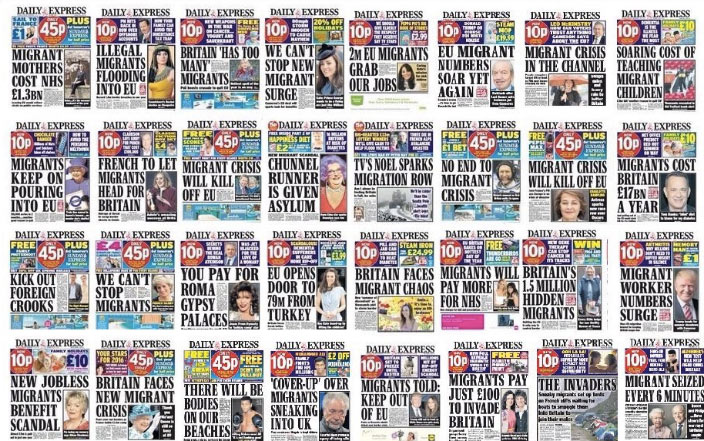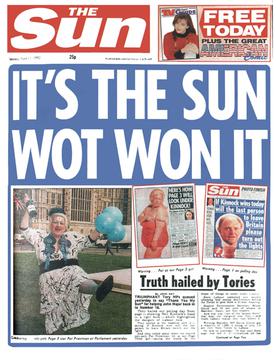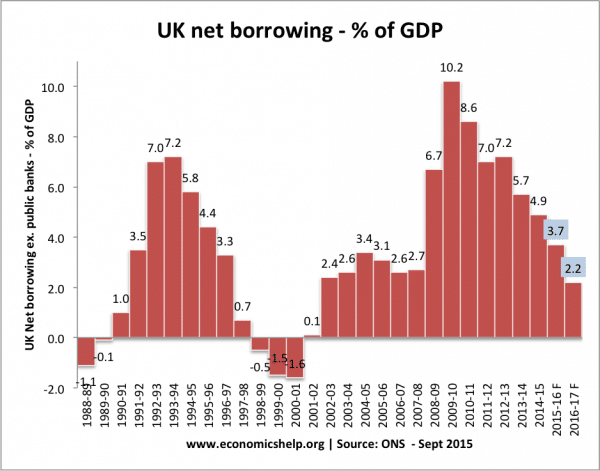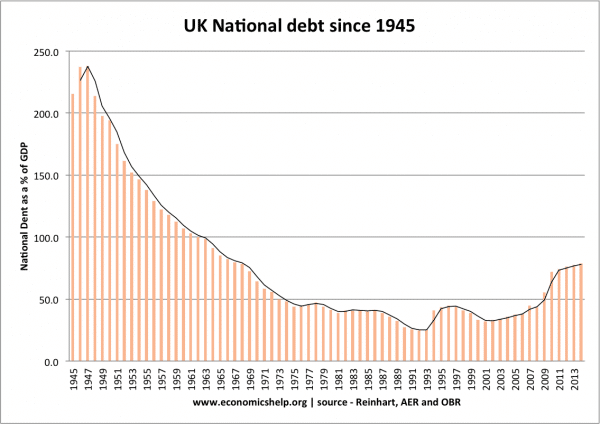At the 1992 General election, the Conservative Party won a stunning electoral victory – despite being in the middle of a self-imposed recession. Many point to this as an example of how the press can influence national debate and influence elections.
The 1991/92 recession was a classic example of a boom and bust. It wasn’t a recession caused by global factors, but domestic mismanagement. In the late 1980s, the chancellor believed there had been a ‘supply side miracle’ raising the UK’s long-run trend rate from 2.5% to 4%. The chancellor, Nigel Lawson kept real interest rates low and cut income tax rates. There was a boom, inflation, but then a deep recession as they tried to control inflation. Despite the economic incompetence, the Conservatives won the election as the Press claimed it was the Labour Party which was economic incompetent and guaranteed to raise taxes.
It was an unlikely election victory, and the following day, the Sun’s headline was “It was the Sun wot won it.”
Some claim the Sun didn’t win the election at all. Certainly, a newspaper headline doesn’t swing an election on its own. But, several years of framing political issues do have an influence on how people view issues and parties.
Politics of Budget deficits
Post-2008 financial crisis, the UK budget deficit rose to record levels as the economy fell into a deep recession. This was classic textbook economics – as the private sector spending falls, the government should maintain demand by borrowing. There was no fiscal crisis, bond yields fell, as the private sector bought more bonds.
However, at the last election, the budget deficit became the most prominent issue. With the media generally portraying the idea it was high levels of government debt that caused the current economic crisis. The media onslaught was so sustained, even the Labour party started to believe it.
Further reading: political appeal of austerity
In 2007, public sector debt was close to a record low. The recession was due to a global financial crisis, but in the minds of voters, it became Labour’s decision to moderately increase spending on the NHS in the mid-2000s. that caused the financial crisis and economic woes of the UK.
The Conservative chancellor latched on to the public fear of government borrowing, coming up with very strict fiscal rules, which – hardly any economist would support. Fears over Labour economic incompetence was a major factor in election defeat and the political support for austerity – despite evidence austerity is counter-productive in a recession and liquidity trap.
Post Brexit Budget deficit.
Post-Brexit, the leading Conservative candidates have announced they will ignore these budget targets (which were frequently revised and never met). This is good economics, in an economic downturn, the last thing you want to do is make a recession definite by an austerity budget.
However, come the next election, the media’s past abhorrence of government debt will be quietly forgotten. Brexit supporting papers will suddenly find that in a time of difficulty (e.g. leaving the EU) government borrowing isn’t such a bad thing after all.
Limitations of the soundbite
The problem with the politics of budget deficits is that it doesn’t lend itself to an easy soundbite. Pick your soundbite.
“Labour borrowing ruined the country”
“Borrowing can be undesirable during periods of economic growth, but also beneficial in times of a liquidity trap and rising private sector savings – where there is a need to maintain aggregate demand.”
Politics of migration

I have examined the merits and demerits of free movement of labour, and feel there are a few economic reasons why free movement of labour is not always optimal. I can understand the desire to restrict free movement of labour, but I’m also aware of the many economic benefits of migration. It is on this issue that the UK press have promoted a very strong agenda giving the impression migration adversely affects NHS, costs UK in benefits and leads to lower wages. There is no attempt at balance or reporting of inconvenient facts. If voters were informed migrants were net contributors to budget, would there have been such a strong desire to leave the EU?
EU bias
The referendum campaign lasted four months, but many newspapers have been campaigning against the EU for the past 10-20 years. Amongst the majority of newspapers, the EU is nearly always framed in a negative light. From the Sun’s ‘Up Yours Delors’ to a certain upcoming journalist Boris Johnson reporting misleading accounts of EU regulations in the Daily Telegraph.
These news stories are often exaggerated or even false, but there seems no attempt to report facts. There is a list of bogus EU myths here
But, what about liberal papers like Guardian and Independent and Times support for EU?
Research finds that weighted by circulation, pro-Brexit articles outnumber pro remain articles more than 4 to 1.
You could also make the point, people buy newspapers which reflect their viewpoints.
What about the BBC’s independence?
The BBC are independent and go to great lengths to give both sides of the debate. Personally, I believe the BBC is a big boon to press coverage in the UK. I fear what would happen if the BBC lost independence and became owned by rich individual (like Fox News / Sky News)
However, in determination to give balance, opinions are often presented as fact and equal weighting given to misleading information. The downside of giving 50/50 split is that there is often no attempt to evaluate the relative significance of an argument. 90% of economists were opposed to Brexit, but the BBC is contractually obliged to give 50% weighting to the minority of Brexit economists who supported Brexit. When the Conservative claim Labour borrowed too much, there was rarely any attempt to put into context, such as showing national debt as % of GDP since the war.
Just because 1% of scientists say Global warming is a hoax, doesn’t mean you should give 50% equal weighting to criticism of global warming.
Everyone believes in media bias
The other side of the coin is that everyone believes the media is biased against their viewpoint. Many on the right claim the BBC has a liberal left-wing bias. Plus it is argued blaming the media becomes a convenient excuse.
Post fact reporting
Arron Banks who was prominent in leave EU campaign mentioned his strategy was to ignore facts and appeal to emotion.
“It was taking an American-style media approach,” said Banks. “What they said early on was ‘facts don’t work’ and that’s it. The remain campaign featured fact, fact, fact, fact, fact. It just doesn’t work. You have got to connect with people emotionally. It’s the Trump success.”
This is true of leave campaign whose most visible promise on the bus was false. This is the real danger of media bias – giving up on facts.
Related




How can we stop papers from manipulating people?
Everyone knows what the papers do but no one knows how they can stop it.
news can be deemed as credible news sources which can often knowingly or unknowingly be pushing political agendas and propaganda